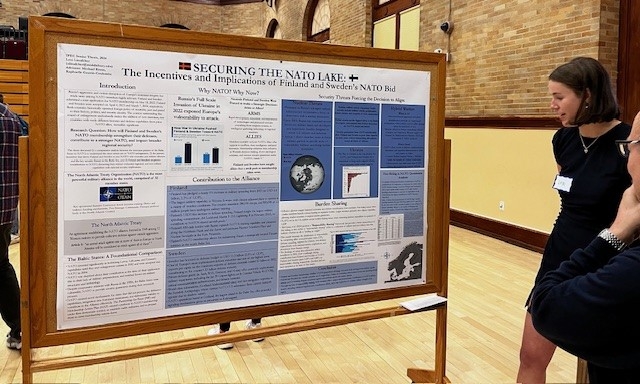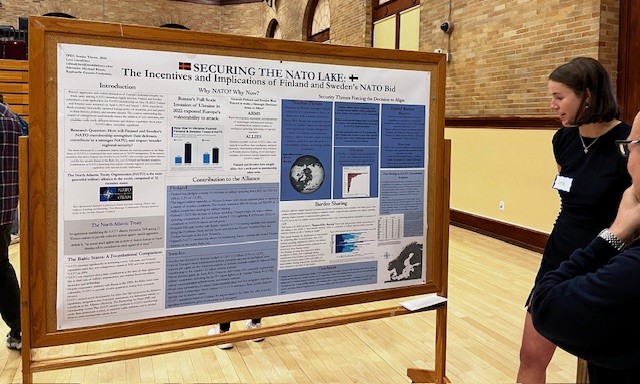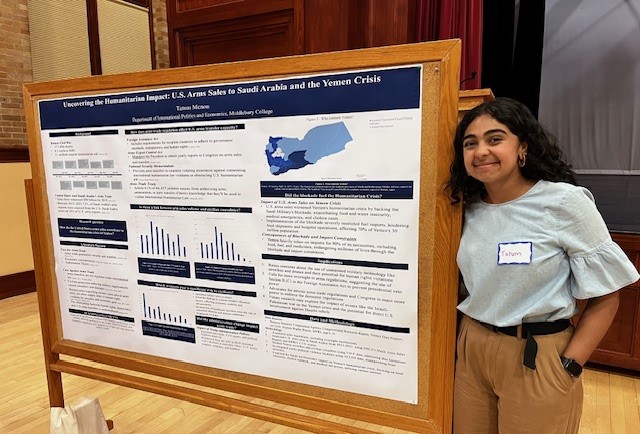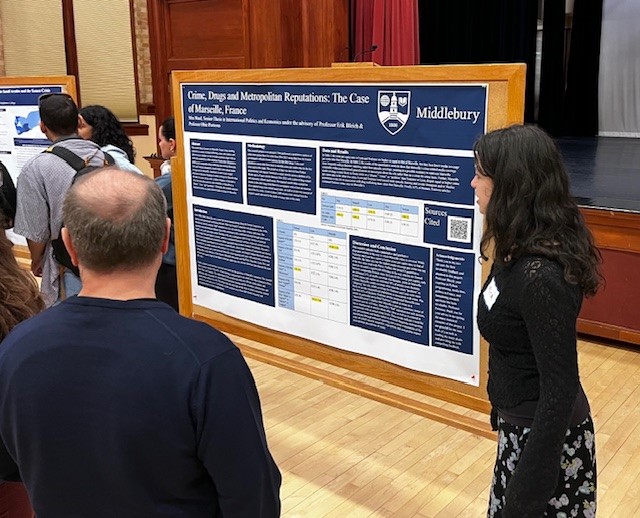Honors Thesis
General Procedures
An International Politics and Economics (IP&E) Honors Thesis is undertaken over the course of two terms. Normally, this will be fall/winter, or winter/spring, though with permission of the advisors it may be spring/fall or fall/spring.
We strongly recommend that (1) students begin thinking about their thesis project and speaking with potential advisors in their junior year; and (2) students who plan to write a thesis also enroll in PSCI 0368 and/or ECON 0211 before registering for IPEC 0700. To launch a thesis project, students must register for IPEC 0700 with the approval of both an economics and a political science advisor. See deadlines. With permission of their advisors, an IP&E thesis candidate may begin his or her project by enrolling in an independent study project (IPEC 0500) in the term preceding the first thesis term. Thesis students must subsequently register for IPEC 0700 to pursue the thesis project.
Requirements
In order to qualify for writing a thesis, students matriculating in Fall 2025 must have a cumulative 3.5 average or better in their IP&E courses taken at Middlebury(3.3 for student matriculation prior to Fall 2025). Middlebury College courses in the Political Science and Economics Departments that can count for the IP&E major (see the Courses webpage) will be used to calculate the IP&E course grade point average. No exception will be made to this requirement.
Background
Students are solely responsible for coming up with thesis topics. Those contemplating writing a thesis are strongly encouraged to search for topics during their junior year. They should either take seminars or conduct independent study projects in order to come up with research ideas. Students should also use their seminars and projects to cultivate potential advisors well in advance of the actual thesis writing process.
If students are spending their junior year abroad, they should contact potential advisors via email. In this way, students are encouraged to keep their advisors apprised of their research interests well before they arrive back on campus in their senior year.
Advisory Process
Students need two advisors, one in Political Science and the other in Economics. Each potential thesis writer must formally notify the IP&E director of his or her choices at the end of the first week of classes as stated in the deadlines. It is up to the students to seek out and schedule appointments with their advisors during the thesis writing process. Students are required to schedule a joint meeting with both advisors at least two times during the thesis process. The first meeting must take place no later than the end of the second week of the first term of the 0700-level thesis project. This meeting will serve to establish communications between the advisors and the student. The second meeting must be scheduled between submitting the first draft prospectus and bibliography and the final prospectus and bibliography. Students should contact both faculty members early to find times convenient to everyone.
In addition to these two advisors, students may seek another advisor from outside of these departments if this is necessary for their research. In order to make this addition, formal approval is required by the two main advisors.
Research Design
All IP&E theses need to be absolutely clear on the following three points. First, students should clarify their question or puzzle, and show how and in what ways it fits into a specific theoretical literature in economics and/or political science. They should also clarify why anyone should care about their puzzle or question. Second, students should identify the most prominent explanations to answer their question or solve their puzzle. They can either use the theoretical literature to derive explanations or offer a new logically consistent explanation on their own. Instead of simply listing explanations or hypotheses, students should focus, above all, on making an argument. Third, students need to collect evidence that allows them to support their argument and refute competing explanations.
As a guide, students should consult Stephen Van Evera, Guide to Methods for Students of Political Science (Cornell University Press, 1997), and Thomas l. Wyrick, The Economist’s Handbook: A Research and Writing Guide (West Publishing Company, 1994).
Thesis Prospectus
Generally, a thesis prospectus should (a) define the research question(s) to be answered in the thesis; (b) explain the intellectual importance of the thesis; and (c) outline how the project will be completed, i.e., sources and methodology that make clear how evidence will be gathered and assessed. The prospectus should be approximately 2,000–2,500 words long.
Both the first draft prospectus and bibliography and the final prospectus and bibliography should be turned in simultaneously to your two advisors.
Style/Format
All IP&E theses should have the following parts in order: (1) a title page, identifying the title of the thesis and the name of the author, date, “Senior Thesis in International Politics and Economics, Middlebury College”; (2) acknowledgments; (3) a table of contents, identifying parts, chapters, etc., in the thesis; (4) an abstract of no more than 300 words, which identifies the main question and argument, summarizes the key evidence, and puts forth the conclusion; (5) body of the text (where chapters are used, each chapter must begin on a new page); and (6) a bibliography or reference list.
The thesis should be printed double-spaced, with adequate one-inch margins. The expected length of the thesis should be determined in consultation with advisors. Article-length theses of 30–40 pages are appropriate for certain projects and have the advantage of being eligible for submission to student academic journals. Many theses range in length from 70–90 pages, with an average of 250–300 words per page. A few will require more space than that. Footnotes should be at the bottom of the page, not at the end of chapters or the thesis.
Students should make absolutely certain to cite all sources, whether primary or secondary. See advice on citations. When in doubt about how to cite properly, students should consult their advisors.
Upon completion, please provide a printed copy of your thesis to your advisors. An electronic copy must also be submitted in PDF format to the IP&E Director and IP&E coordinator.
Honors/Regulation
In order to receive honors, students must meet the deadlines.
The thesis grade is based on the quality of the written thesis as well as the oral defense with the student and their two advisors.
The determination of honors, high honors, and highest honors is based on (1) the grade achieved on the thesis, and (2) the IP&E course grade point average. Note that courses taken abroad do not count toward the IP&E grade point average, but Middlebury College courses in Political Science and Economics that count for the IP&E major (see Course Listings) will be used to calculate the IP&E course grade point average. Honor candidates must have an IP&E course average of 3.3 and a thesis grade of B+ to achieve honors; an IP&E course average of at least 3.5 and a thesis grade of A- or higher to attain high honors; and an IP&E course average of at least 3.7 and a thesis grade of A to attain highest honors.
Any appeal of a thesis grade, or the award of honors, shall be made to the IP&E director.







